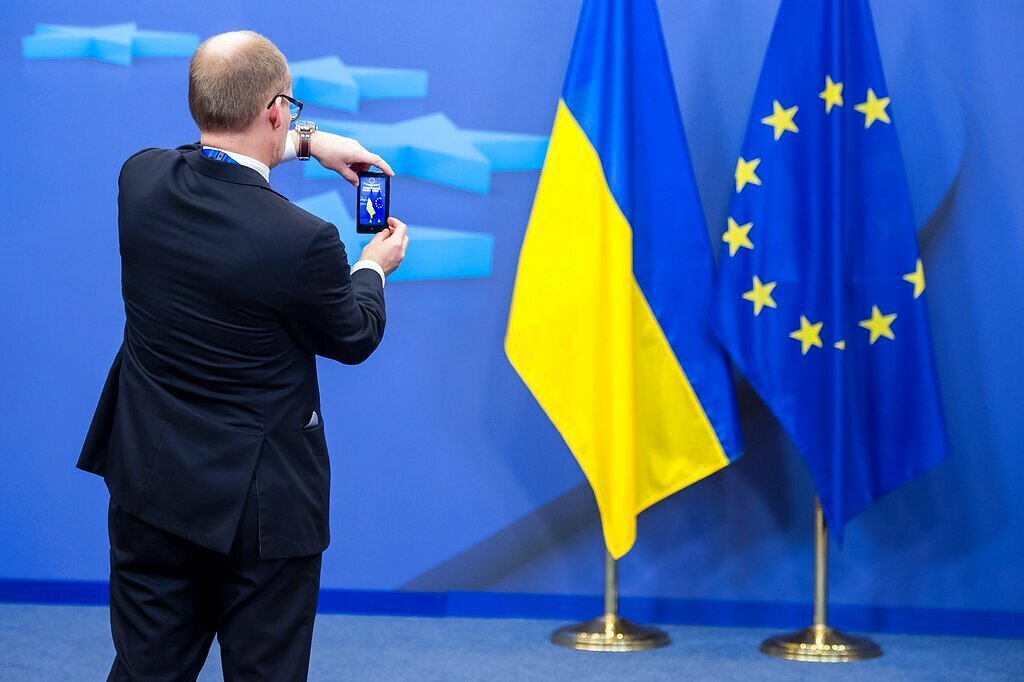Granting Ukraine EU candidate status would further support its journey towards democracy, strong rule of law and a functioning market economy. The Eastern Partnership (EaP) framework plays a significant role in this process and can help rebuild not only Ukraine after the war ends but also support the other Eastern Partnership counties.
The EaP policy has been a key instrument since it was established in 2009 as a joint initiative between the EU, its member states and six Eastern European and South Caucasus partner countries: Armenia, Azerbaijan, Belarus, Georgia, Republic of Moldova and Ukraine.
The EaP policy aims to foster better relations between countries, facilitate the domestic reform process and support European integration. The areas of cooperation have a two-track approach. On the bilateral level, the policy is designed to foster better relations between EU and each one of the EaP countries, respectively.
The multilateral track provides a framework for cooperation and exchange of best practices and becomes even more important after three of the EaP countries recently submitted their applications for membership in the EU.
President Volodymyr Zelenskyy submitted Ukraine’s request to join the EU on 28 February 2022 – just four days after the war began. Since then, Moldova and Georgia also submitted their applications, and discussions are ongoing about the possibility of granting all three countries EU candidate status.
On 18 April, only ten days after President of the European Commission Ursula von der Leyen handed it to President Zelenskyy, Ukraine submitted its completed questionnaire to EU authorities, on the basis of which the EU will decide whether to grant the country EU candidate status.
The ball is now in the EU’s court. The decision will be taken by the European Council, following the European Commission’s opinion of Ukraine’s suitability for membership in accordance with the Copenhagen criteria, but also with respect to political considerations.
In fact, the EU institutions’ final decision on granting Ukraine EU candidate status is inherently political for two reasons. Normally the opinion is based on the assessment of several aspects, from judging the existing political momentum and people’s expectations, to fairly assessing the country’s democratic track record, to assessing implications for the Eastern Partnership policy overall.
In Ukraine’s case, the Commission and the Council will also have to take into account that Ukraine finds itself in the middle of a devastating war of defence against Russia’s unprovoked and illegal invasion. Granting candidate status to Ukraine would send a strong political signal and strengthen its European perspective even if the actual accession process might take many years.
The Copenhagen criteria for EU membership consist of a functioning market economy, stable democracy, strong rule of law, and the capacity to implement all EU legislation. The results of the Eastern Partnership Index 2020-21 – a monitoring tool produced by EaP CSF – show that Ukraine has already cemented considerable normative and legal approximation to the EU.
Through a mix of progress and setbacks, the country has been advancing slowly but steadily towards EU standards. Gaps still persist between the law and the implementation of norms, particularly when it comes to fighting corruption and ensuring judicial independence.
But the democratic progress achieved so far is a testament to the far-reaching effects of the EaP policy framework and the implementation of the Association Agreement (AA) with Ukraine from 2014 - which sparked the Maidan revolution - and the following Deep and Comprehensive Free Trade Areas (DCFTA) in 2016.
With its dedicated financial, administrative and technical support, the EaP policy has effectively contributed to guiding the democratic progress of Ukraine and its fellow association countries and its results so far testify to the democratic development potential that the EU candidate status can bring.
Candidate status and the EaP policy
In this respect, some commentators have been speculating that granting EU candidate status to Ukraine in particular – the biggest country of the EaP group – would automatically result in the termination of its participation in the Eastern Partnership framework, thus implying the end of the policy altogether.
In fact, granting EU candidate status to Ukraine – and Moldova and Georgia – should be considered compatible with the existing EaP framework and the EU should be wary of giving up a policy – and its associated toolbox - that has delivered results and supported democratic development in its neighbourhood. Maintaining the EaP policy alongside EU candidate status opens up a number of opportunities for both the EU and the EaP region, while shielding each other from a number of risks.
So far, the EaP – particularly in its multilateral dimension – has functioned as a framework to address important priorities – such as democracy, human rights, rule of law and structural reforms. Coherence in the EaP region will be essential to address common challenges that the region faces, and will continue to face, such as corruption, the rule of law, connectivity and climate change.
In times of tense relations among neighbours, the multilateral Eastern Partnership framework continues to offer a mediated space for ongoing dialogue among politicians, public administration, civil society and other non-state actors alike, increasing chances for conciliation and negotiation.
After the war in Ukraine, regional EaP tools and structures will be instrumental in addressing environmental damage and cross-border problems, which Ukraine will have to tackle in cooperation with Moldova and also Belarus. Lastly, but not for lack of importance, with Azerbaijan and Belarus, the EaP multilateral track has been the only possible platform for dialogue.
The results of the EaP Index show a widening gap between the Ukraine, Georgia and Moldova on one hand and Belarus and Azerbaijan on the other hand. This is a testament to the dangers posed by a lack of democratic development and a clear perspective, which makes countries more vulnerable to subjugation and exploitation at the hands of national and foreign autocrats.
Investing in the democratic development of some countries at the expense of others is not a functional approach to security, nor a fair application of European values. Ensuring the continuity of the Eastern Partnership policy would send an important message to stakeholders in Armenia and to democratic Belarusian and Azerbaijani actors about the opportunity that exists for their countries.
The EaP was just entering a new phase when the war caught the EU – and the world – off guard. This offers an excellent opportunity to adjust the framework to current developments and make it fit for purpose. Maintaining a strong, regional framework will be essential in ensuring the overall development and resilience of the region. Weakening it significantly would be a strategic mistake the EU cannot afford to make.


